From Brewery to Biofilter: Making Yeast-Based Water Purification Possible
May 15, 2024 — Atlanta, GA

When looking for an environmentally friendly and cost-effective way to clean up contaminated water and soil, Georgia Tech researchers Patricia Stathatou and Christos Athanasiou turned to yeast. A cheap byproduct from fermentation processes — e.g., something your local brewery discards in mass quantities after making a batch of beer — yeast is widely known as an effective biosorbent. Biosorption is a mass transfer process by which an ion or molecule binds to inactive biological materials through physicochemical interactions.
When they initially studied this process, Stathatou and Athanasiou found that yeast can effectively and rapidly remove trace lead — at challenging initial concentrations below one part per million — from drinking water. Conventional water treatment methods either fail to eliminate lead at these low levels or result in high financial and environmental costs to do so. In a paper published today in RSC Sustainability, the researchers show how this process can be scaled.
“If you put yeast directly into water to clean it, you will need an additional treatment step to remove the yeast from the water afterward,” said Stathatou, a research scientist at the Renewable Bioproducts Institute and an incoming assistant professor at the School of Chemical and Biomolecular Engineering. “To implement this process at scale without requiring additional separation steps, the yeast cells need a housing.”
“Additionally, because yeast is abundant— in some cases, brewers even pay companies to haul it away as a waste byproduct — this process gives the yeast a second life,” said Athanasiou, an assistant professor in the Daniel Guggenheim School of Aerospace Engineering. “It’s a plentiful low, or even negative, value resource, making this purification process inexpensive and scalable.”
To develop a housing for the yeast, Stathatou and Athanasiou partnered with MIT chemical engineers Devashish Gokhale and Patrick S. Doyle. Gokhale and Stathatou are the lead authors of this new study that demonstrates the yeast water purification process’s scalability.
“We decided to make these hollow capsules— analogous to a multivitamin pill — but instead of filling them up with vitamins, we fill them up with yeast cells,” Gokhale said. “These capsules are porous, so the water can go into the capsules and the yeast are able to bind all of that lead, but the yeast themselves can’t escape into the water.”
The yeast-laden capsules are sufficiently large, about half a millimeter in diameter, for easy separation from water by gravity. This means they can be used to make packed-bed bioreactors or biofilters, with contaminated water flowing through these hydrogel-encased yeast cells and coming out clean.
Stathatou and Athanasiou envision using these hydrogel yeast capsules in small biofilters consumers can put on their kitchen faucets, or biofilters large enough to fit municipal or industrial wastewater treatment systems. But to enable such scalability, the yeast-laden capsules’ ability to withstand the force generated by water flowing inside such systems needed to be studied as well.
To determine this, Athanasiou tested the capsules’ mechanical robustness, which is how strong and sturdy they are in the presence of waterflow forces. He found they can withstand forces like those generated by water running from a faucet, or even flows like those in water treatment plants that serve a few hundred homes. “In previous attempts to scale up biosorption with similar approaches, lack of mechanical robustness has been a common cause of failure,” Athanasiou said. “We wanted to make sure our work addressed this issue from the very beginning to ensure scalability.”
“After assessing the mechanical robustness of the yeast-laden capsules, we made a prototype biofilter using a 10-ml syringe,” Stathatou explained. “The initial lead concentration of water entering the biofilter was 100 parts per billion; we demonstrated that the biofilter could treat the contaminated water, meeting EPA drinking water guidelines, while operating continuously for 12 days.”
The researchers hope to identify ways to isolate and collect specific contaminants left behind in the filtering yeast, so those too can be used for other purposes.
“Apart from lead, which is widely used in systems for energy generation and storage, this process could be used to remove and recover other metals and rare earth elements as well,” Athanasiou said. “This process could even be useful in space mining or other space applications.”
They also would like to find a way to keep reusing the yeast. “But even if we can’t reuse yeast indefinitely, it is biodegradable,” Stathatou noted. “It doesn’t need to be put into an industrial composter or sent to a landfill. It can be left on the ground, and the yeast will naturally decompose over time, contributing to nutrient cycling.”
This circular approach aims to reduce waste and environmental impact, while also creating economic opportunities in local communities. Despite numerous lead contamination incidents across the U.S., the team’s successful biosorption method notably could benefit low-income areas historically burdened by pollution and limited access to clean water, offering a cost-effective remediation solution. “We think there’s an interesting environmental justice aspect to this, especially when you start with something as low-cost and sustainable as yeast, which is essentially available anywhere,” Gokhale says.
Moving forward, Stathatou and Athanasiou are exploring other uses for their hydrogel-yeast purification method. The researchers are optimistic that, with modifications, this process can be used to remove additional inorganic and organic contaminants of emerging concern, such as PFAS — or “forever” chemicals — from the water or the ground.
Citation: Devashish Gokhale, Patritsia M. Stathatou, Christos E. Athanasiou, and Patrick S. Doyle, “Yeast-laden Hydrogel Capsules for Scalable Trace Lead Removal from Water,” RSC Sustainability.
DOI: https://doi.org/10.1039/D4SU00052H
Funding: Patricia Stathatou was supported by funding from the Renewable Bioproducts Institute at Georgia Tech. Devashish Gokhale was supported by the Rasikbhai L. Meswani Fellowship for Water Solutions and the MIT Abdul Latif Jameel Water and Food Systems Lab (J-WAFS).

Shelley Wunder-Smith
Generating Buzz: Climate Change Takes Center Stage
May 07, 2024 — Atlanta, GA

Ice caps
April is Earth Month, and according to the National Oceanic and Atmospheric Administration, 2023 was the warmest year on record for our planet. As the global conversation around the climate and humans’ effect on it continues, Georgia Tech researchers are taking a leading role in quantifying the issues posed by climate change and crafting solutions for the road ahead.
The latest episode of Generating Buzz follows the College of Sciences’ Frontiers in Science event, giving listeners an opportunity to hear from experts, including dean and renowned oceanographer Susan Lozier, Associate Professor Alex Robel, Professor Valerie Thomas, and Associate Vice President of Sustainability Jennifer Chirico as they explore the intersection of science, policy, and human nature.
Steven Gagliano
Georgia Tech and Meta Create Massive Open Dataset to Advance AI Solutions for Carbon Capture
May 02, 2024 — Atlanta

A Georgia Tech researcher examines a component of a direct air capture system that employs carbon fiber strands. Direct air capture systems require chemical materials that can grab carbon dioxide.
To avoid catastrophic climate impacts, excessive carbon emissions must be addressed. At this point, cutting emissions isn’t enough. Direct air capture, a technology that pulls carbon dioxide out of ambient air, has great potential to help solve the problem.
But there’s a big challenge. For direct air capture technology, every type of environment and location requires a uniquely specific design. A direct air capture configuration in Texas, for example, would necessarily be different from one in Iceland. These systems must be designed with exact parameters for humidity, temperature, and air flows for each place.
Now, Georgia Tech and Meta have collaborated to produce a massive database, potentially making it easier and faster to design and implement direct air capture technologies. The open-source database enabled the team to train an AI model that is orders of magnitude faster than existing chemistry simulations. The project, named OpenDAC, could accelerate climate solutions the planet desperately needs.
The team’s research was published in ACS Central Science, a journal of the American Chemical Society.
“For direct air capture, there are many ideas about how best to take advantage of the air flows and temperature swings of a given environment,” said Andrew J. Medford, associate professor in the School of Chemical and Biomolecular Engineering (ChBE) and a lead author of the paper. “But a major problem is finding a material that can capture carbon efficiently under each environment’s specific conditions.”
Their idea was to “create a database and a set of tools to help engineers broadly, who need to find the right material that can work,” Medford said. “We wanted to use computing to take them from not knowing where to start to giving them a robust list of materials to synthesize and try.”
Containing reaction data for 8,400 different materials and powered by nearly 40 million quantum mechanics calculations, the team believes it’s the largest and most robust dataset of its kind.
Building a Partnership (and a Database)
Researchers with Meta’s Fundamental AI Research (FAIR) team were looking for ways to harness their machine learning prowess to address climate change. They landed on direct air capture as a promising technology and needed to find a partner with expertise in materials chemistry as it relates to carbon capture. They went straight to Georgia Tech.
David Sholl, ChBE professor, Cecile L. and David I.J. Wang Faculty Fellow, and director of Oak Ridge National Laboratory’s Transformational Decarbonization Initiative, is one of the world’s top experts in metal-organic frameworks (MOFs). These are a class of materials promising for direct air capture because of their cagelike structure and proven ability to attract and trap carbon dioxide. Sholl brought Medford, who specializes in applying machine learning models to atomistic and quantum mechanical simulations as they relate to chemistry, into the project.
Sholl, Medford, and their students provided all the inputs for the database. Because the database predicts the MOF interactions and the energy output of those interactions, considerable information was required.
They needed to know the structure of nearly every known MOF — both the MOF structure by itself and the structure of the MOF interacting with carbon dioxide and water molecules.
“To predict what a material might do, you need to know where every single atom is and what its chemical element is,” Medford said. “Figuring out the inputs for the database was half of the problem, and that’s where our Georgia Tech team brought the core expertise.”
The team took advantage of large collections of MOF structures that Sholl and his collaborators had previously developed. They also created a large collection of structures that included imperfections found in practical materials.
The Power of Machine Learning
Anuroop Sriram, research engineering lead at FAIR and first author on the paper, generated the database by running quantum chemistry computations on the inputs provided by the Georgia Tech team. These calculations used about 400 million CPU hours, which is hundreds of times more computing than the average academic computing lab can do in a year.
FAIR also trained machine learning models on the database. Once trained on the 40 million calculations, the machine learning models were able to accurately predict how the thousands of MOFs would interact with carbon dioxide.
The team demonstrated that their AI models are powerful new tools for material discovery, offering comparable accuracy to traditional quantum chemistry calculations while being much faster. These features will allow other researchers to extend the work to explore many other MOFs in the future.
“Our goal was to look at the set of all known MOFs and find those that most strongly attract carbon dioxide while not attracting other air components like water vapor, and using these highly accurate quantum computations to do so,” Sriram said. “To our knowledge, this is something no other carbon capture database has been able to do.”
Putting their own database to use, the Georgia Tech and Meta teams identified about 241 MOFs of exceptionally high potential for direct air capture.
Moving Forward With Impact
“According to the UN and most industrialized countries, we need to get to net-zero carbon dioxide emissions by 2050,” said Matt Uyttendaele, director of Meta’s FAIR chemistry team and a co-author on the paper. “Most of that must happen by outright stopping carbon emissions, but we must also address historical carbon emissions and sectors of the economy that are very hard to decarbonize — such as aviation and heavy industry. That’s why CO2 removal technologies like direct air capture must come online in the next 25 years.”
While direct air capture is still a nascent field, the researchers say it’s crucial that groundbreaking tools — like the OpenDAC database made available in the team’s paper — are in development now.
“There is not going to be one solution that will get us to net-zero emissions,” Sriram said. “Direct air capture has great potential but needs to be scaled up significantly before we can make a real impact. I think the only way we can get there is by finding better materials.”
The researchers from both teams hope the scientific community will join the search for suitable materials. The entire OpenDAC dataset project is open source, from the data to the models to the algorithms.
“I hope this accelerates the development of negative-emission technologies like direct air capture that may not have been possible otherwise,” Medford said. “As a species, we must solve this problem at some point. I hope this work can contribute to getting us there, and I think it has a real shot at doing that.”
Note: Georgia Tech ChBE graduate students Sihoon Choi, Logan Brabson, and Xiaohan Yu made major contributions and are co-authors of the paper.
Citation: A. Sriram et al, The Open DAC 2023 Dataset and Challenges for Sorbent Discovery in Direct Air Capture, ACS Central Science (2024).
DOI: https://doi.org/10.1021/acscentsci.3c01629
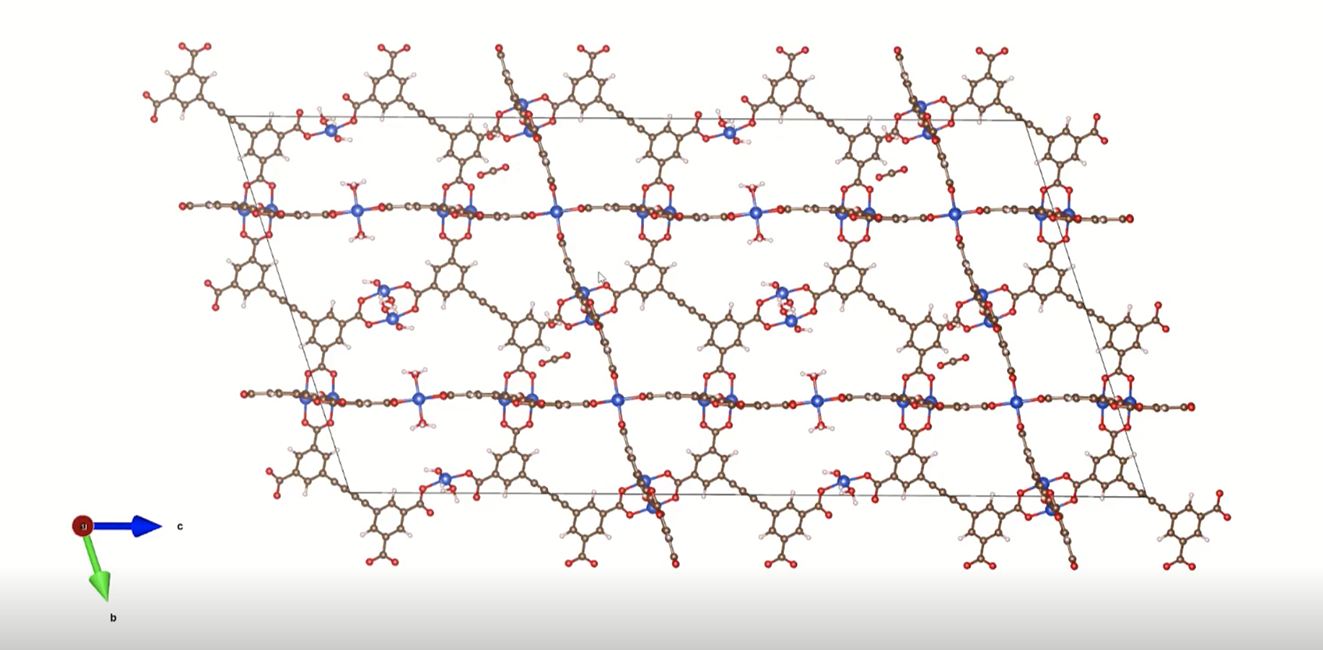
A visualization of a metal-organic framework. (Credit: Logan Brabson)
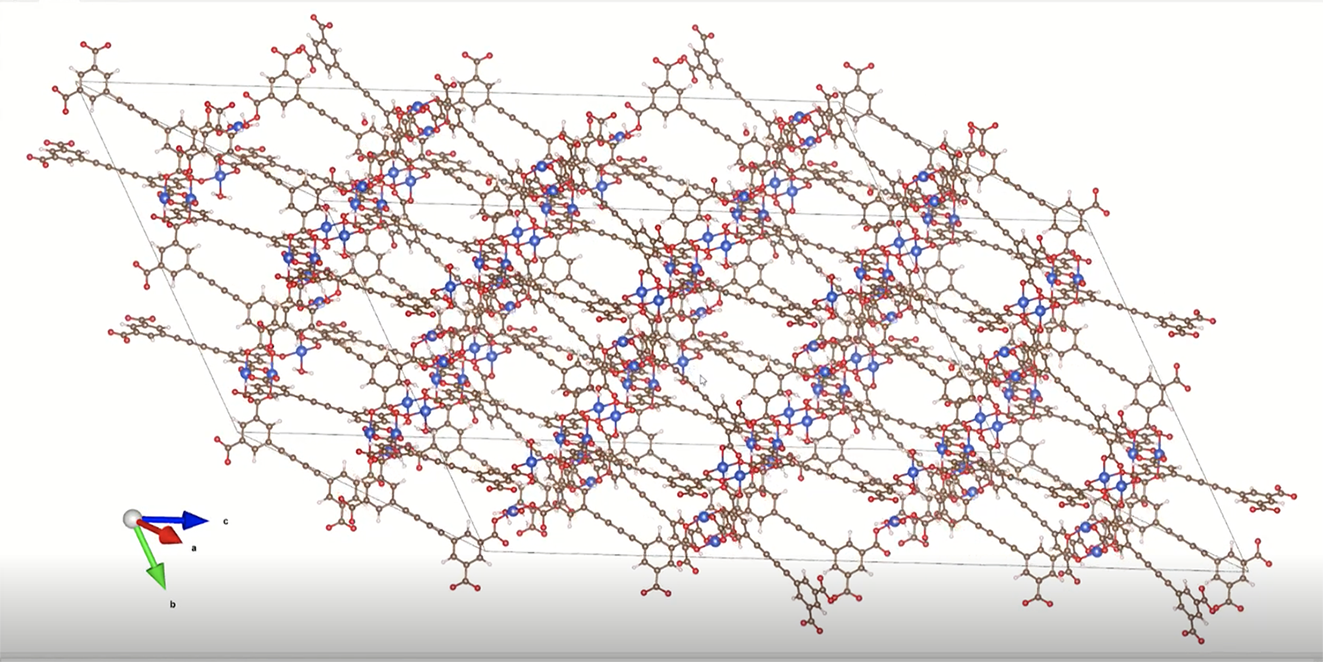
A visualization of the same metal-organic framework, which has been rotated to show porosity and dimension. (Credit: Logan Brabson)
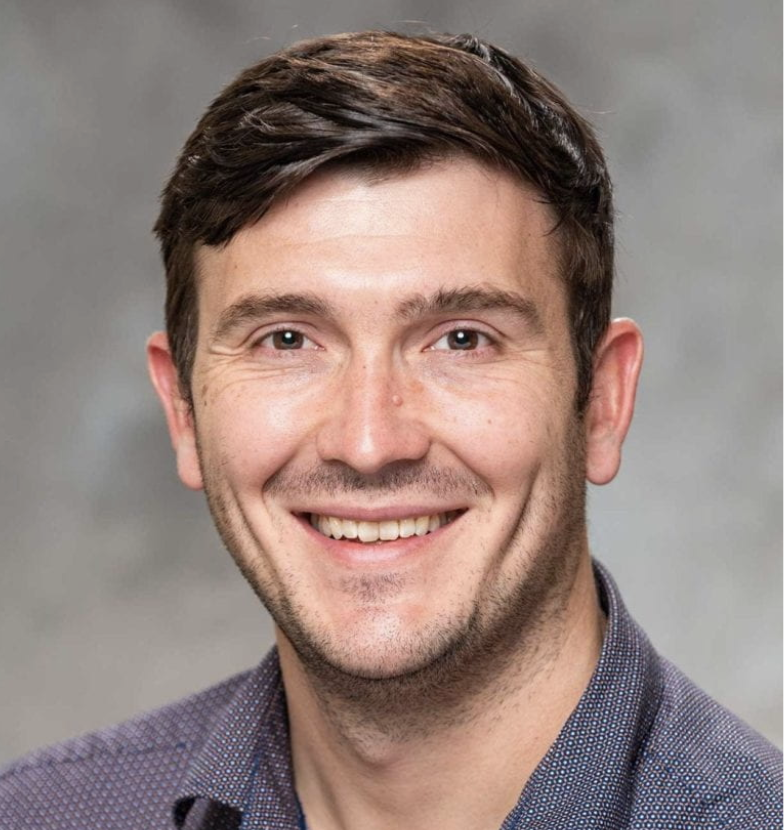
Andrew J. Medford, associate professor in the School of Chemical and Biomolecular Engineering (ChBE).
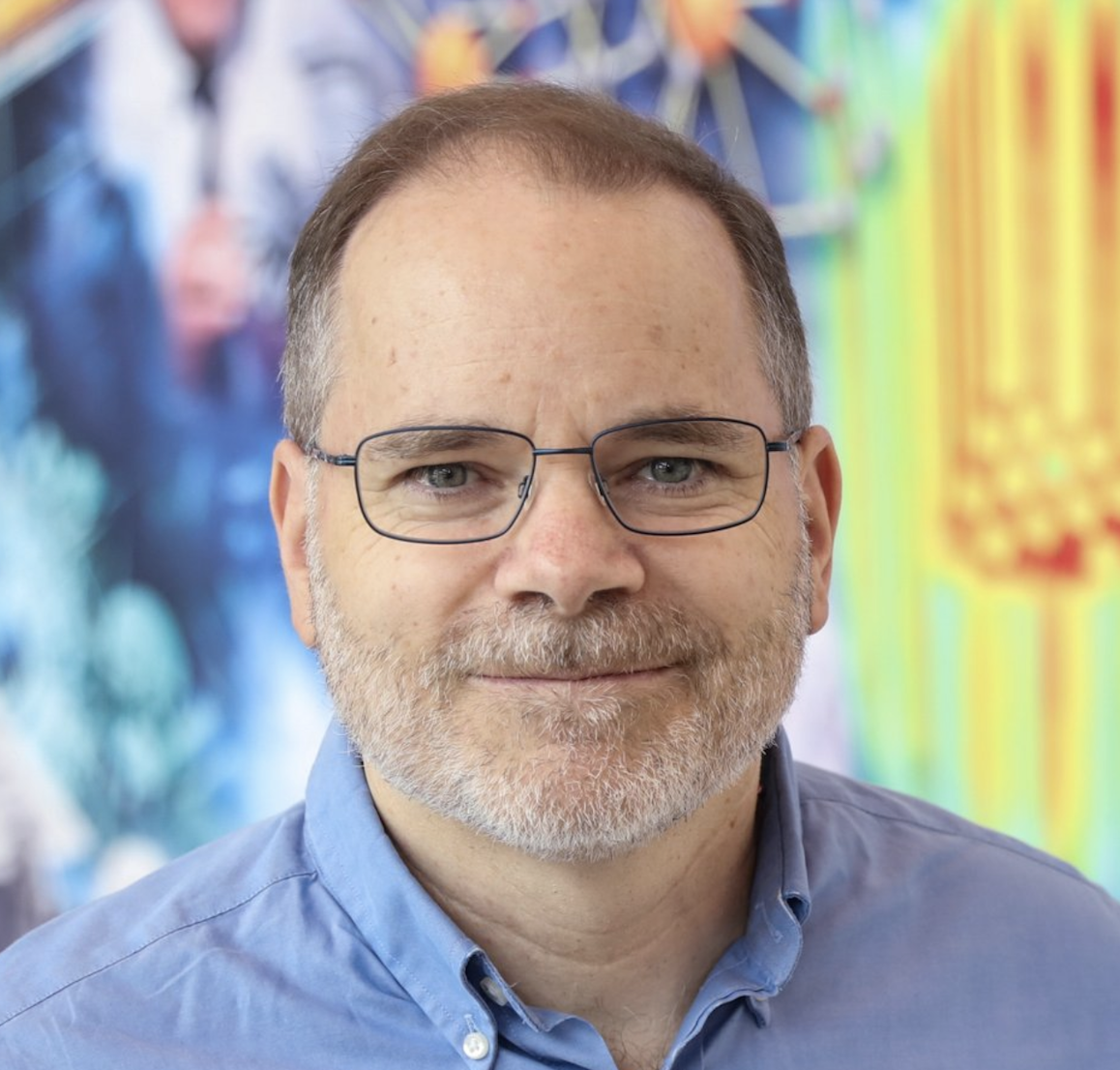
David Sholl, ChBE professor, Cecile L. and David I.J. Wang Faculty Fellow, and director of Oak Ridge National Laboratory’s Transformational Decarbonization Initiative
Catherine Barzler, Senior Research Writer/Editor
Spring Workshop Engages Diverse Stakeholders in Shaping the Future of Biorefining and the Bioeconomy
Mar 28, 2024 — Atlanta, GA
From Left to Right: Gary Black, Bo Arduengo, and Andy Bommarius (RBI Strategic Initiative Lead) from the ReWOOD Initiative, Larissa Fenn from RYAM, Andreas Villegas, President of the Georgia Forrest Association and Keynote Speaker, Chris Luettgen RBI Strategic Initiative Lead, Carsten Sievers, RBI Strategic Initiative Lead, Matthew Realff, RBI Strategic Initiative Lead, Carson Meredith, RBI Executive Director, and Valerie Thomas, RBI Strategic Initiative Lead.
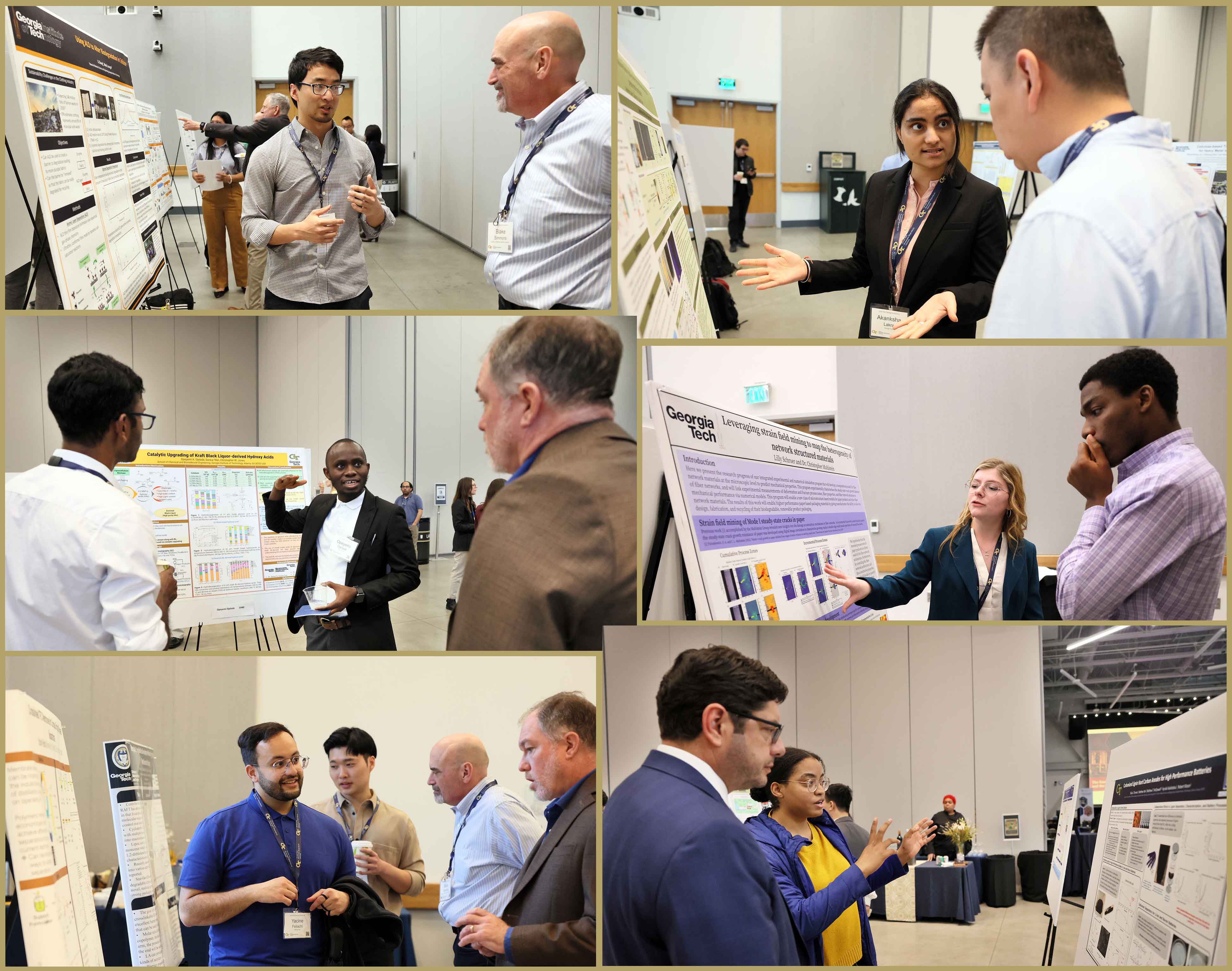
RBI Fellows Discussing Their Research with the Workshop Participants
With the nation’s goals to net zero well underway and the world moving toward sustainable production methods, biorefineries play a crucial role in our transition to a greener future. These multifaceted facilities convert biomass into biofuels, biochemicals, and bioproducts; foster a circular economy; and reduce reliance on fossil fuels while promoting environmentally friendly industrial practices.
The Renewable Bioproducts Institute (RBI) at Georgia Tech recently hosted a workshop on the Emerging Bioeconomy and the Future of Biorefining. The event cultivated new partnerships as more than 75 attendees from academia, national laboratories, and industry shared and learned about the cutting-edge developments in the emerging field.
Carson Meredith, executive director of RBI, said, “The workshop provided an immersive experience for the attendees with access to knowledge, opportunities to network, and a platform for collaboration to positively impact their understanding and involvement in this rapidly evolving field. I saw a lot of human connections being made, a lot of people shaking hands, and having conversations off to the side. That’s exactly why we hold such workshops — to exchange ideas within the Institute as well as between researchers in universities, industry, and national labs.”
The program started with a keynote by B. Frank Gupton, professor of chemical and life science engineering at Virginia Commonwealth University, on creating resilient national supply chains for essential medicines and the need for waste reduction through process chemistry improvements to reduce the carbon footprint in the pharmaceutical industry.
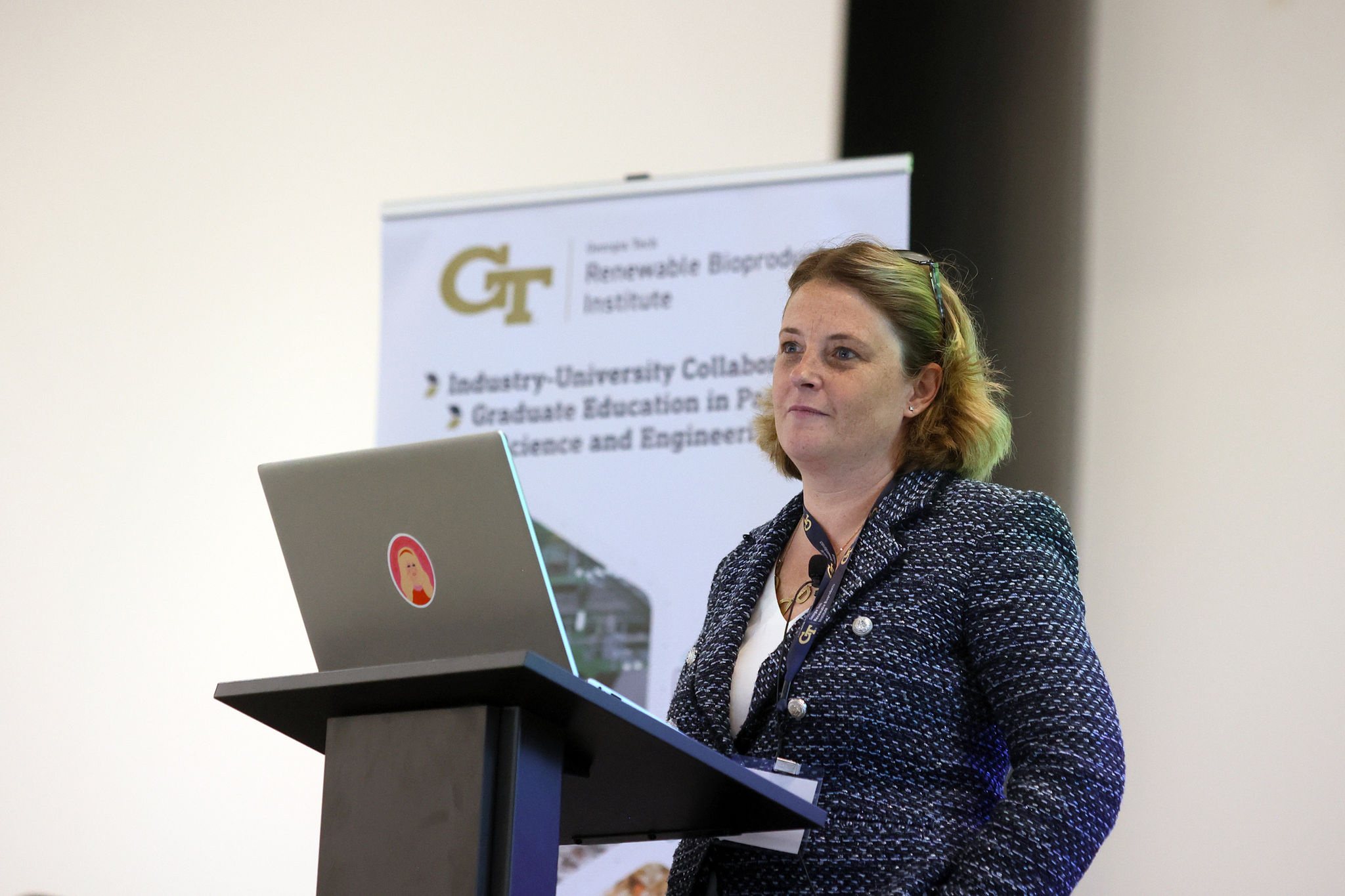
Kim Nelson, CTO of GranBio and Georgia Tech Alumnus at the
2024 RBI Spring Workshop
Various presentations from RBI’s research faculty demonstrated the depth of research in the field of bioeconomy and biorefineries. Topics included integrated biorefining processes by multicomponent separations and catalytic conversion, lignin-derived phenol as the new platform of biorefineries, catalytic conversion of organic acids, data-driven biorefinery process control, hot topics in lifecycle assessment, and more.
A highlight of the annual workshop was the student poster session that showcased the diversity of research happening in the renewable bioproducts field. Over 25 RBI Fellows, spanning chemical and biomolecular engineering, mechanical engineering, materials science and engineering, civil and environmental engineering, and chemistry and biochemistry presented their research to a highly engaged audience.
Andreas Villegas, president of the Georgia Forestry Association and the dinner keynote speaker, addressed the need for educating the community about working forests and their potential to create carbon-neutral products and reduce greenhouse gas emissions. Working forests in the state of Georgia are managed with a growth-over-harvest-rate of 50% and are a natural solution to the major challenges in sustainable forests and communities.
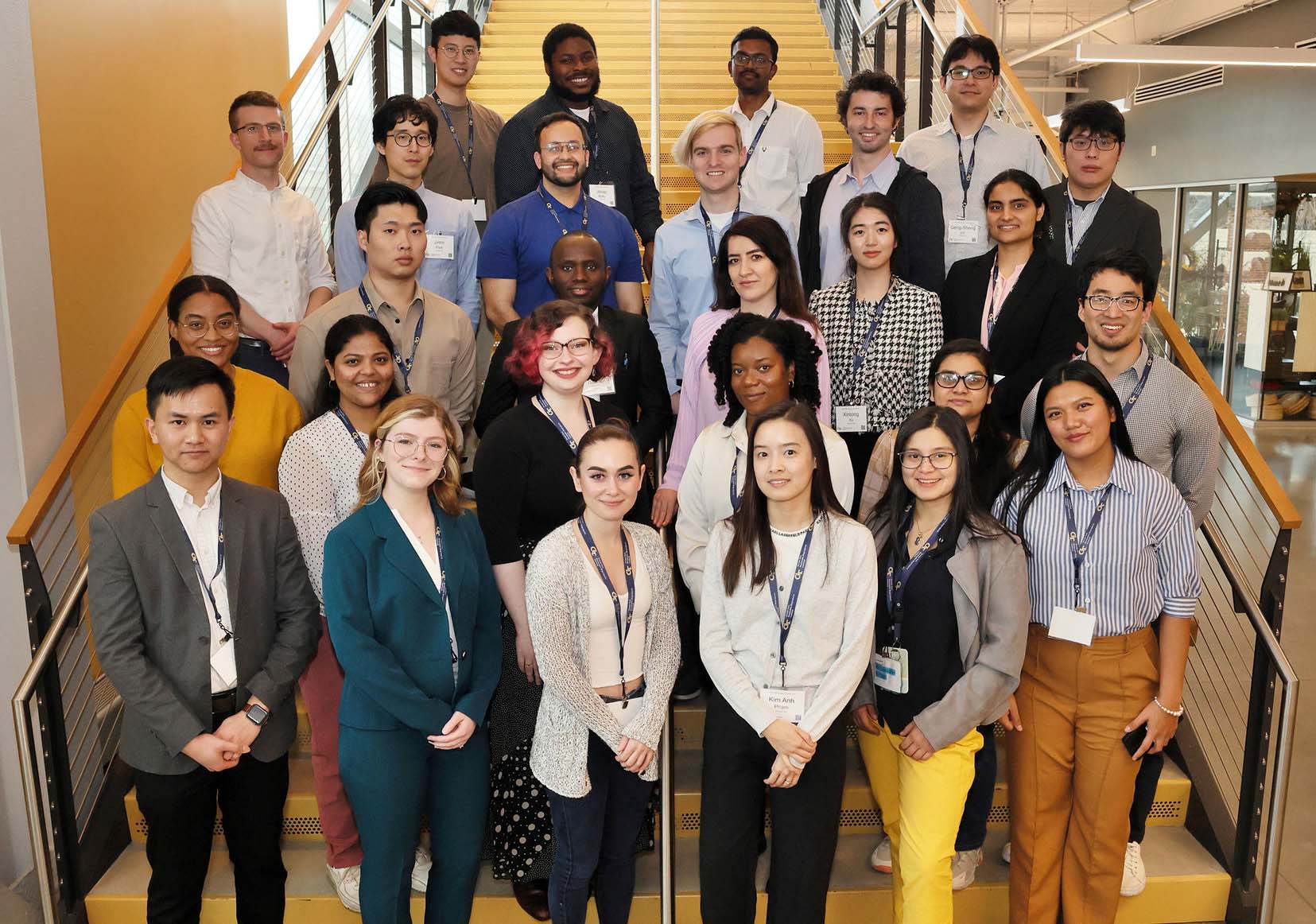
2024 RBI Student Fellows at the Workshop
Blake Simmons, keynote speaker from the Lawrence Berkeley National Laboratory, discussed the importance of intellectual property models and licensing technology models that will allow companies to access new processes emerging in the field.
Mi Li, assistant professor of biorefinery and sustainable materials from the University of Tennessee, presented his research on the modification of plant cell walls, while Bronson P. Bollock, professor of forest biometrics and quantitative timber management at the University of Georgia, presented the current issues and factors in the quantification of forest biomass feedstocks.
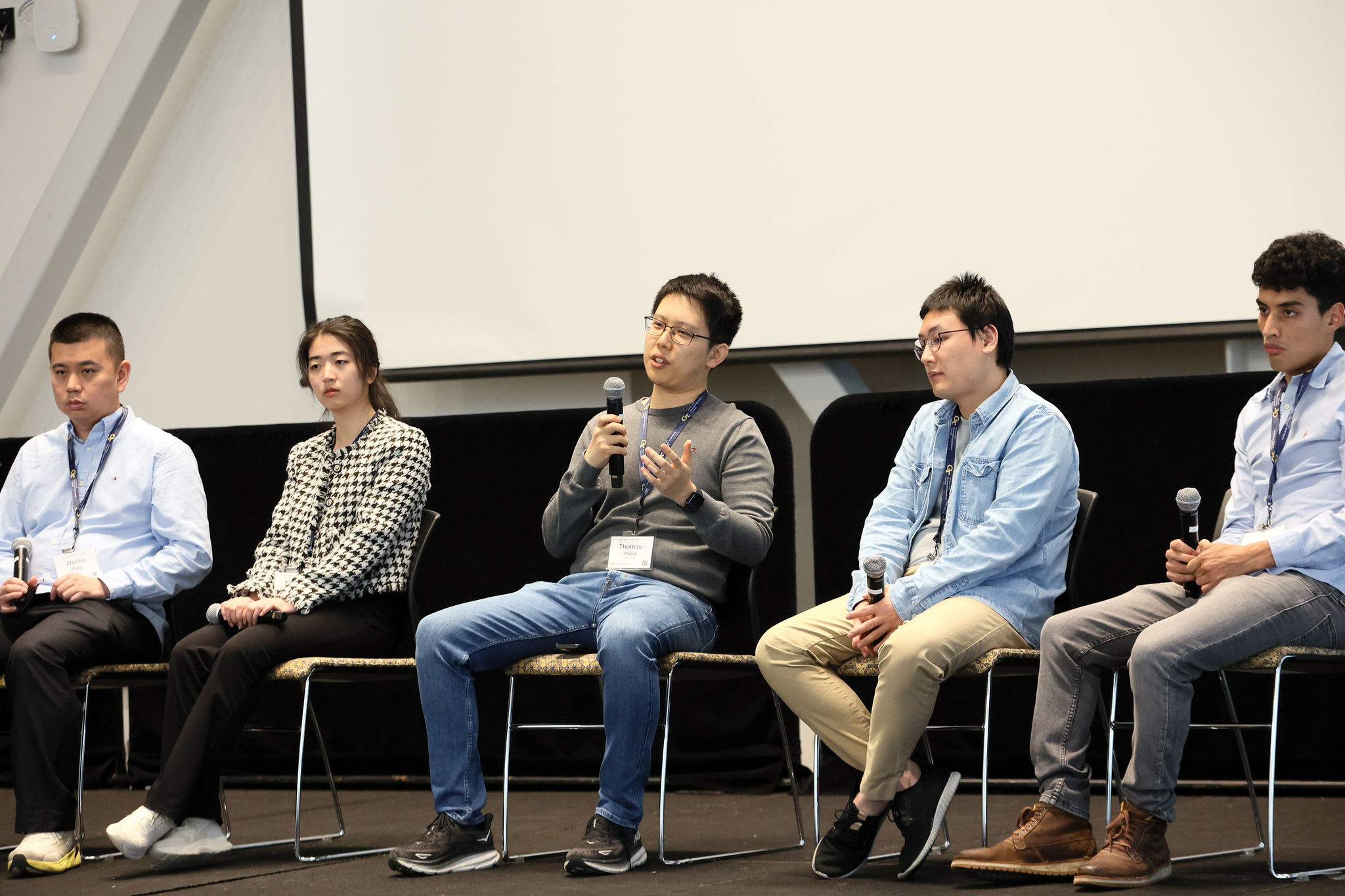
Student Panel at the RBI Spring Workshop
Kim Nelson, the chief technology officer of GranBio, addressed the opportunities and challenges in meeting the global demand for sustainable aviation fuel (SAF) and low-carbon bioproducts. Nelson presented GranBio’s patented AVAP technology that uses woody biomass to produce SAF, renewable diesel, electricity, and other byproducts like BioPlus nanocellulose for tires in the process.
“At this moment, there is a tremendous federal, state, and industrial focus on developing the U.S. bioeconomy,” Meredith said. “RBI's vision is that pulp producers and users of wood extractives and byproducts have an opportunity to develop higher margin products from woody biomass residues, including plastics, pharmaceuticals, and fuels, without disrupting current paper and lumber markets. Traditional petrochemical producers of these products have an opportunity to substitute more carbon-neutral sources as feedstocks. Our workshop sought a conversation around the opportunities and challenges from feedstock to the marketplace.
Priya Devarajan || RBI Communications Program Manager
Photo Credit: Leah Yetter, Photographer
Georgia Tech Launches Quadrant-i, a New Unit to Enhance Research Commercialization
Apr 03, 2024 —

Georgia Tech Launches Quadrant-i, a New Unit to Enhance Research Commercialization
Georgia Tech's Office of Commercialization introduces Quadrant-i, a new unit dedicated to helping faculty, researchers, and students translate their research into startups.
The name is inspired by Pasteur’s quadrant in the Daniel Stokes innovation-impact model and will emphasize the translation of deep scientific research into products. (See more information about Pasteur’s quadrant here.)
Quadrant-i will join the other units in commercialization — the Office of Technology Licensing, VentureLab, and CREATE-X — in making Georgia Tech the premier campus for startups and commercialization.
“As we grow our efforts toward delivering impact through commercialization, creating a unit that is solely focused on helping our faculty, students, and researchers launch startups based on their research is essential,” said Raghupathy “Siva” Sivakumar, vice president of Commercialization and chief commercialization officer.
The functions of Quadrant-i have historically been supported by VentureLab, a national leader in entrepreneurship training and research. The reorganization will also allow VentureLab to amplify its impact in making Georgia Tech a thought leader for entrepreneurship.
Quadrant-i will be a comprehensive resource for the thriving research community on campus, facilitating the journey from innovations to impact. The unit will offer programs, resources, and services tailored to expedite and enhance the commercialization process, including:
- Advocating for policy changes and incentive structures to foster a culture of impact.
- Securing non-dilutive grant funding.
- Navigating conflicts of interest to maintain research integrity.
- Providing mentorship on the business aspects of innovation.
- Interfacing with customers, investors, and mentors.
- Launching startups with essential resources and support.
A search is currently underway for a director, who will report to Sivakumar.
The Office of Commercialization invites faculty, researchers, students, investors, mentors, industry leaders, and innovators to collaborate with Quadrant-i and learn more about its programs and services.
For more information, visit: commercialization.gatech.edu/quadrant-i.

Lacey Cameron
Marketing Communications Manager
Georgia Tech Receives Industrial Efficiency and Decarbonization Grants
Mar 14, 2024 — Atlanta, GA

From Left to Right: Carson Meredith, Valerie Thomas, Tim Lieuwen
In January, Georgia Tech researchers were awarded three grants as a part of the Department of Energy’s Industrial Efficiency and Decarbonization multi-topic funding. The awards include 49 high-impact, applied research, development, and pilot-scale technology validation and demonstration projects that will reduce energy usage and greenhouse gas emissions in conjunction with cross-sector industrial decarbonization approaches.
The Georgia Tech funding includes a project, in the topic area of Decarbonizing Forest Products, on innovative refining, paper forming, and drying to eliminate CO2 emissions from paper machines. Funded at $3.1 million, the project is led by Carson Meredith, professor and James Harris Faculty Fellow in the School of Chemical and Biomolecular Engineering and executive director of the Renewable Bioproducts Institute (RBI). Collaborators include co-PI Cyrus Aidun, professor of mechanical engineering; Patritsia Stathatou, research scientist at RBI; and Aruna Weerasakura, senior research engineer. External collaborators include Fort Valley State University, the National Renewable Energy Laboratory, and several RBI member companies.
Meredith’s project focuses on decarbonization in energy-intensive drying, paper forming, and pulping processes and will combine recent deflocculation breakthroughs in fiber refining with low-water, multiphase paper forming. The innovations will facilitate the cost-effective implementation of advanced electrical drying technologies in the paper industry. By taking advantage of the increasing fraction of non-fossil electricity in the U.S., electrified drying, if implemented partially (50%), has the potential to reduce the generation of non-biogenic emissions by over 10 million metric tons of CO2e annually.
"I am excited because the new project will utilize the multiphase forming laboratory that is under construction in the Paper Tricentennial Building, representing the first major expansion in lab space there since the 1990s,” said Meredith.
Valerie Thomas, the Anderson-Interface Chair of Natural Systems and professor of industrial and systems engineering and public policy, is a co-PI in a $1.45 million project titled “Mild Co-Solvent Pulping to Decarbonize the Paper and Forest Products Sector,“ led by the University of California, Riverside.
Thomas’ project, also under the topic area of Decarbonizing Forest Products, aims to enhance Co-solvent Enhanced Lignocellulosic Fractionation (CELF) technology into a more environmentally sustainable alternative to traditional kraft pulping. CELF technology will be applied to optimize the production of dissolving pulp used in the manufacturing of extruded textile fibers and will also produce dissolving lignin as a by-product that can serve as a natural resin binder or a renewable ingredient for producing industrial adhesives and binders. This technology has the potential to reduce carbon intensity by 50 – 75% and operating costs by 10 – 20%.
Tim Lieuwen, David S. Lewis Jr. Chair and professor in aerospace engineering and executive director of the Strategic Energy Institute, along with Vishal Acharya, principal research engineer and Benjamin Emerson, principal research engineer at Georgia Tech is a co-PI in a $3.25 million project titled “Omnivore Combustion System,” led by GTI Energy, an Illinois-based technology company.
Lieuwen’s project, under the topic area of Low-Carbon Fuels Utilization R&D, will design and demonstrate a scaled, adaptable omnivore combustion system (OCS) that can accommodate a continuously varying blend of low-carbon fuels with ultra-low nitrous oxide emissions, including natural gas-hydrogen blends, syngas, and biogas. The project will demonstrate a full-scale OCS for at least 100 hours and will focus on three aspects — improving performance, operation stability and safety, and fuel flexibility — and can potentially be used for industrial furnace applications in high carbon-emitting industries.
“The industrial sector is large in both its significance for our economy and its negative climate impacts, and each of these projects addresses significant challenges for the decarbonization of this critical sector,” Lieuwen said.
The projects are part of DOE’s Technologies for Industrial Emissions Reduction Development (TIEReD) Program, which invests in fundamental science, research, development, and initial pilot-scale demonstrations projects to decarbonize the industrial sector — currently responsible for a third of the nation’s greenhouse gas emissions.
Priya Devarajan || Research Programs Communications Manager || RBI || SEI
2024 RBI Spring Workshop on the Emerging Bioeconomy and the Future of Biorefining
On March 4-5, the Renewable Bioproducts Institute will host a one-and-a-half-day in-person workshop on "The Emerging Bioeconomy and the Future of Biorefining.“ Attendees will learn about cutting-edge developments in this up and coming field and an opportunity to network with leading researchers and peers from the industry.
Museum Receives Award
Feb 02, 2024 — Atlanta, GA
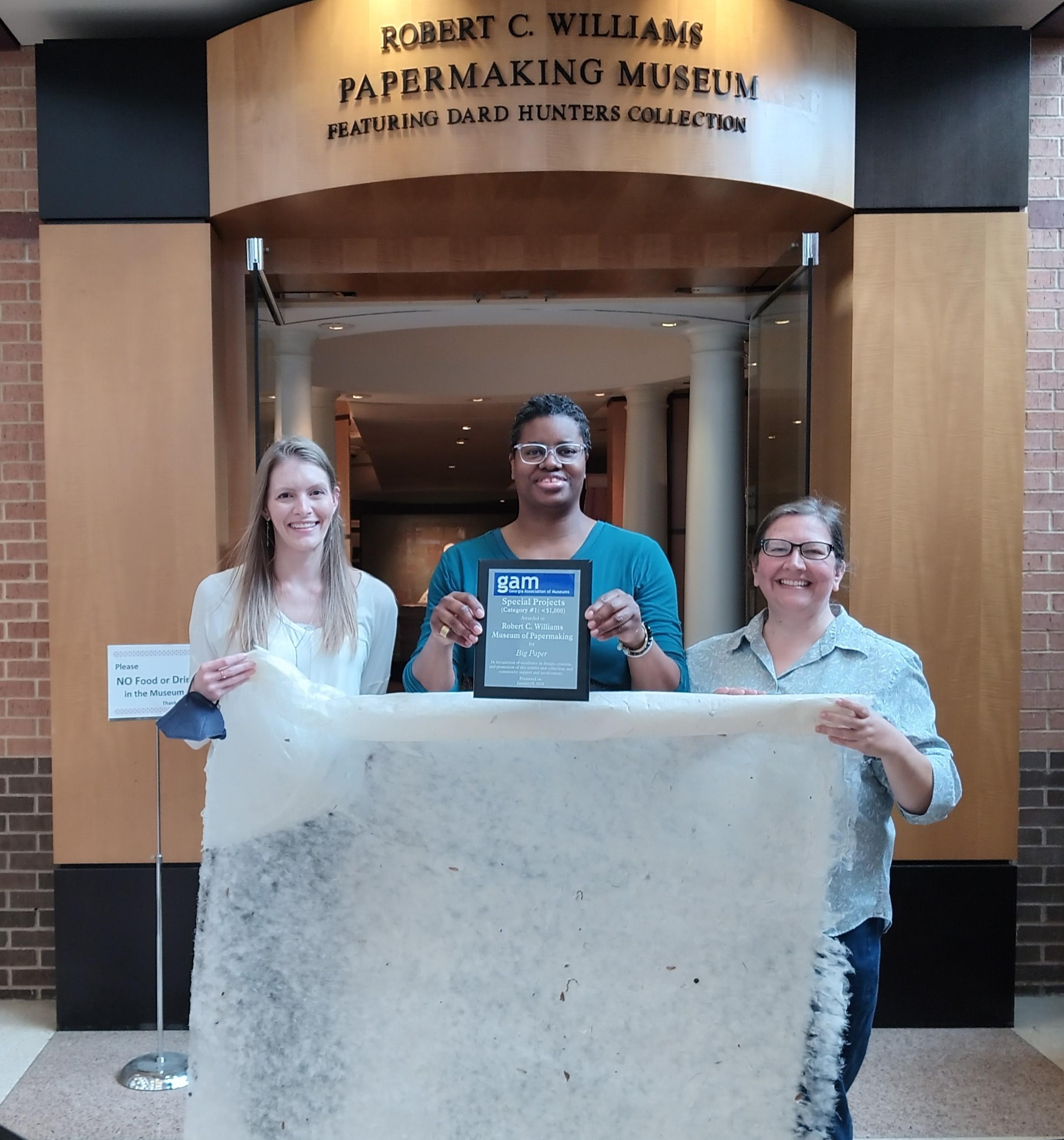
Museum staff Anna Doll, Jerushia Graham, and Virginia Howell pose with a large sheet of paper and an award from the Georgia Association of Museums for the project "Big Paper."
Over 200 museum professionals recently descended upon Athens, Georgia, for the annual meeting of the Georgia Association of Museums (GAM). They arrived from all regions of the state, from Rome to Thomasville to Savannah. The theme of the 2024 conference was “Finding the Right Frequency: Museums and Communities in Harmony.” Attendees participated in a variety of sessions and workshops ranging from developing education programs to designing eye-catching exhibits and visiting with vendors whose products and services target the field. Many Athens-Clarke County museums and cultural institutions opened their doors to attendees for tours and events. The highlight of the week was the annual GAM Awards Luncheon.
This year the Robert C. Williams Museum of Papermaking was presented the Special Project (under $1,000) award by GAM President Marcy Breffle and Award Committee Co-Chairs Melissa Swindell and Karin Dalton for the project “Big Paper.” “We are very pleased to present this award to a very deserving recipient,” said GAM President Breffle. “Our members represent a good cross section of museums and cultural organizations in Georgia’s communities, large and small,” she added. “We are happy to honor institutions, staff members, volunteers, patrons, exhibits, and special projects that have excelled in providing inspiring programs and leadership,” she concluded.
Under the guidance of museum staff Jerushia Graham and Anna Doll, “Big Paper” is a project in which groups from nearby colleges and universities experience making large sheets of paper – 4’ x 6’—in a communal setting. From preparing fiber by hand beating plant material to working together to fill a papermaking mold, students worked together to create something huge! The inaugural event was in April, 2023, and had participants from the University of Georgia, Spelman College, Kennesaw State University, and the Georgia State University Art Club. The event returns in 2024 with noted papermaker Tom Balbo, founding director of the Morgan Conservatory, leading the communal event.
Museum Director Virginia Howell says, “The Paper Museum is honored to receive this award. It is a testament to the hard work of the museum team, and the project has allowed us to build on relationships with so many people who are interested in learning more about the papermaking process and how it can be an incredibly fun yet challenging experience.”
Big Paper returns on April 13, 2024.
Virginia Howell
virginia.howell@rbi.gatech.edu
404-894-5726
Paper Museum Employee Shares Talents With Atlanta
Jan 30, 2024 — Atlanta, GA
Jerushia Graham, museum coordinator for the Robert C. Williams Museum of Papermaking, in front of her digital billboard honoring the unofficial "mayor" of Auburn Avenue John Wesley Dobbs. (Photo by Allison Carter)
Georgia Tech employees, like Jerushia Graham, often contribute their time and talents to the greater Atlanta community. Graham, museum coordinator for the Robert C. Williams Museum of Papermaking, recently created a digital billboard as part of Local Stories, an initiative that presents lesser-known facts about downtown Atlanta’s rich history.
Graham’s work honors the leadership and legacy of John Wesley Dobbs, a political activist and the unofficial “mayor” of Atlanta’s Auburn Avenue during the first half of the 20th century, through papercutting and animation.
“The graphic quality of papercuts requires a whittling down of visual information to the essential details,” she said. “After careful consideration, I settled on directing the viewer’s attention to Dobbs’ role in mobilizing the Black vote because his voter registration efforts made concrete and lasting changes.”
Graham’s digital billboard, entitled LEGACY: John Wesley Dobbs, is reminiscent of vintage postcards and posters. The design choice is an intentional nod by Graham to Dobbs’ many years of service as a postal officer. The U.S. Postal Service, one of the few institutions in the U.S. with an integrated workforce at the time, was arguably one of the largest employers of African Americans. Dobbs would ultimately be promoted to a supervisory role over both Black and white employees.
“Although LEGACY is technically a digital billboard, I personally think of it as a postcard from me to each and every viewer reminding them and myself that our lives leave an impact,” Graham said. “I ask that we invest in one another, engage with the history of Atlanta, and participate in the decisions that govern our lives by voting.”
Local Stories are displayed monthly on the digital sign at Margaret Mitchell Square (140 Peachtree St. NW).
Institute Communications
